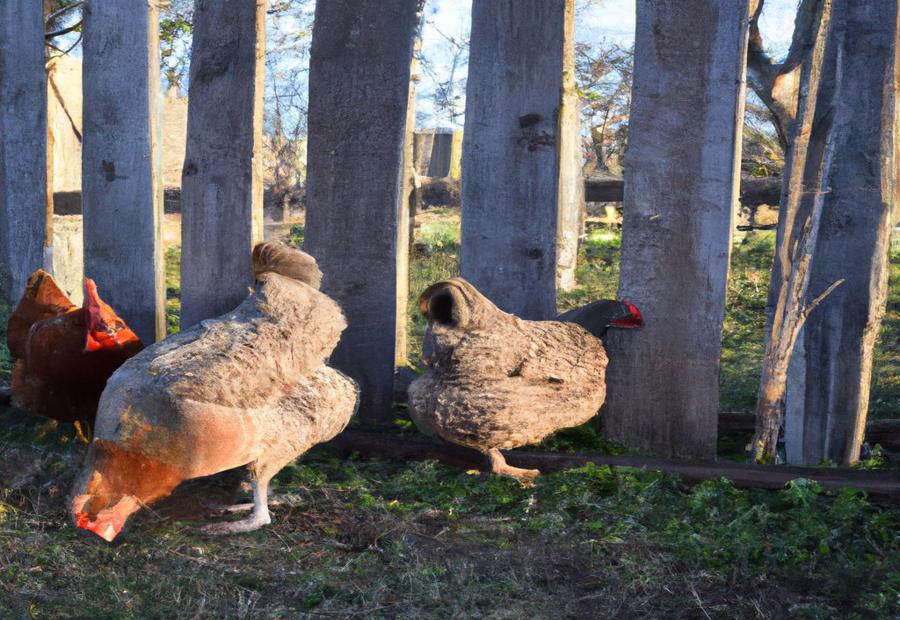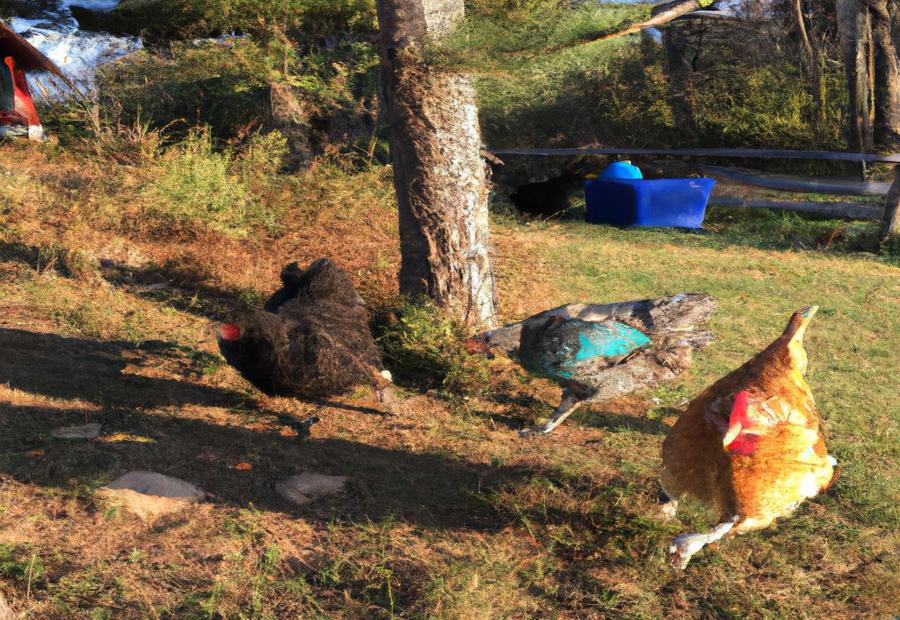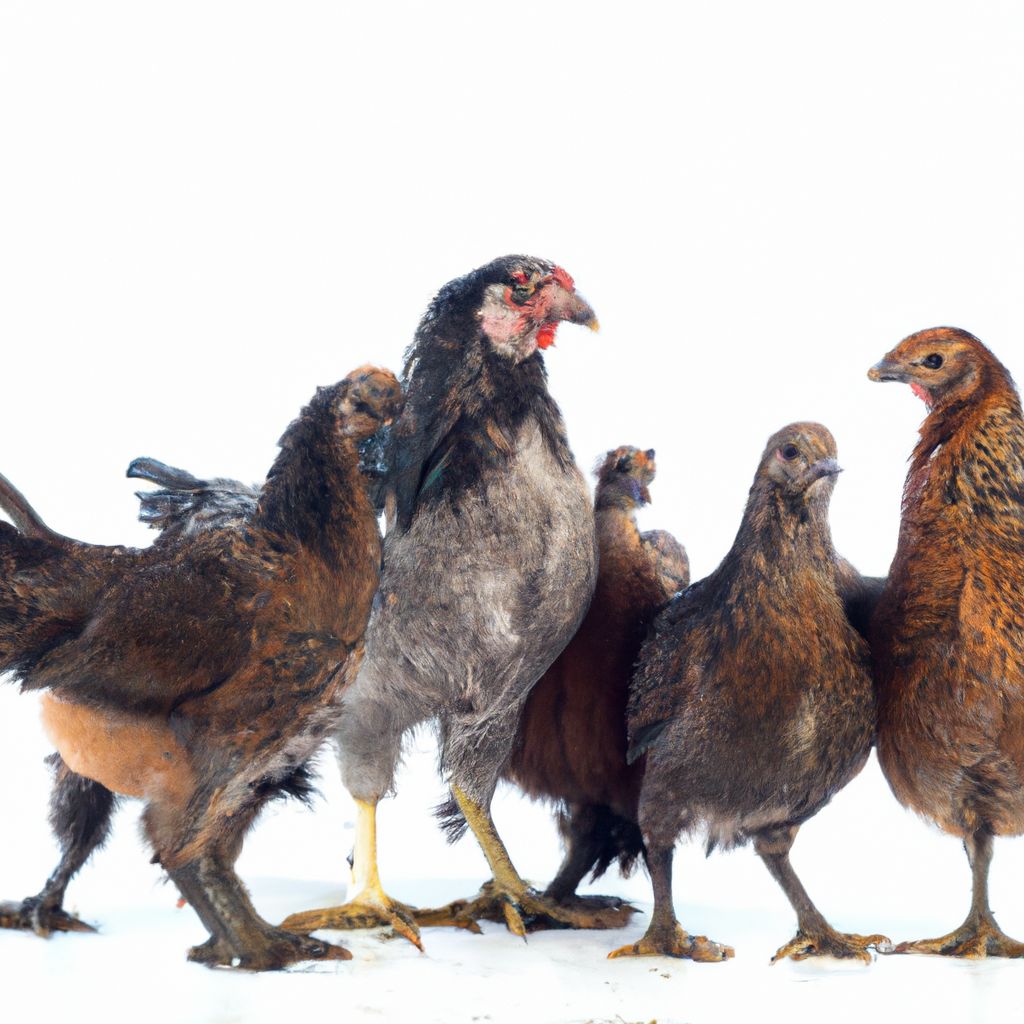Questions About Birds
How Do Chickens Know To Stay In The Yard
Key Takeaways:
- Chickens have a natural sense of home and tend to stay in familiar areas.
- Creating a secure environment with proper fencing and wing clipping helps prevent escapes.
- Training chickens to stay in the yard can be achieved through teaching boundaries and using verbal commands and positive reinforcement.
- Keeping chickens engaged and content in the yard can be done by creating a stimulating environment and providing perches and roosting areas.
- Preventing chickens from damaging neighbors’ property involves minimizing attractants outside the yard and keeping chickens out of gardens.
- Protecting chickens from predators requires installing reliable fencing and understanding common predators and taking precautions.
- The rewards of having free-range chickens include bonding with chickens, enjoying fresh eggs, and organic fertilizer.
Introduction
Chickens possess a mysterious capability to stay within their yards, despite the lack of physical restrictions. This behavior, seen by poultry owners and researchers, is an enigma. It raises the question of how chickens sense their boundaries. To comprehend this peculiarity, we need to explore the instinctive and learned behaviors that affect chickens’ spatial perception and navigation skills.
Chickens have an innate territoriality. This helps them recognize and become familiar with their area, providing them with safety and ease. Plus, chickens use their sharp eyesight to recognize distinct landmarks and environmental cues inside their territory, assisting them in determining the limits of their yard.
In addition to their natural instincts, chickens learn through experience and observation to understand their environment’s spatial boundaries. Eventually, they create a mental map of their yard, storing significant markers and landmarks that signal their territory’s edge. This information aids their movements and stops them from entering strange or perilous areas.
Moreover, chickens are affected by their social interactions and ranking within the flock. They tend to stick close to their companions and abide by a structured pecking order. This hierarchy has an impact on their behavior, including staying within their yard. The presence and vocalizations of dominant members can serve as a guide for chickens, encouraging them to remain within the limits of their yard.
Understanding Chickens’ Natural Behavior

Photo Credits: Chipperbirds.Com by Aaron White
Chickens’ Sense of Home
Chickens have a strong sense of home. This is essential for their well-being. They create a place they feel safe in. This sense of home helps them stay secure and act naturally.
Chickens love to explore their surroundings. They have a range they stay close to, where they find food, water, and shelter. They also have favorite spots, like dustbathing areas or perching spots.
Providing a secure environment is key to their sense of home. Fencing and wing clipping can help keep them in the designated area. Training chickens to stay also reinforces this. Verbal commands and rewards help them understand their boundaries.
Keeping chickens engaged and content is another part of nurturing their sense of home. Objects, such as pecking blocks or treats, provide mental stimulation. Roosting areas allow them to rest comfortably.
To prevent chickens from leaving, it is important to minimize attractants outside the yard. Use barriers or fences to keep them out of gardens.
Protecting chickens from predators is essential for their sense of home and safety. Install reliable fencing to keep out coyotes or foxes. Know common predators and take precautions.
Having free-range chickens has great rewards. Bond with them, get fresh eggs, and enjoy organic fertilizer.
Roam like a free-range chicken, but know your boundaries!
Chickens’ Wanderings and Roaming Range
Chickens have a natural desire to roam and wander. This is part of their instincts and helps them find food, explore, and form social structures. They also forage for insects, seeds, and other food sources, which is beneficial for their health.
For chickens to safely roam, owners must provide a secure environment. Fencing is essential, as well as clipping wings. Also, training chickens to stay within the yard is important. This can be done with verbal commands and positive reinforcement.
Apart from safety, chickens need an engaging environment. Hiding treats and providing dust baths are great ways to do this. Roosting areas and perches also give chickens a place to feel safe.
To make sure chickens don’t damage neighbors’ property, owners must prevent attractants outside the yard. They should also install barriers or deterrents to keep chickens out of gardens.
Predators pose a risk to chickens, so owners must install reliable fencing and take extra precautions. This may include securing coops at night or installing motion-sensor lights or deterrents.
Free-range chickens offer many rewards – they can bond with owners, produce fresh eggs, and make organic fertilizer. However, safety is the top priority, so secure fencing and wing clipping are key.
The Importance of Providing a Secure Environment
Fencing Options
Electric fencing is an excellent choice for containing chickens. It creates a shock deterrent, stopping them from trying to escape. Chicken wire fencing is also great, as it’s affordable and easy to install. Wooden fencing provides both security and beauty. Chain link fencing is strong and durable, while mesh netting creates an enclosed area for the chickens to roam. Wing clipping and secure fencing are essential for keeping chickens safe and contained.
Preventing Escapes with Wing Clipping
Wing clipping is a practice common among chicken owners. It means trimming the primary flight feathers on one wing, causing an imbalance that prevents strong upward flight. Chickens can still glide short distances and maneuver. It’s just temporary and must be done with care to not cause stress or pain. Regular inspection is needed cause feathers regrow over time.
Wing clipping is effective, but consider other factors too. Chickens will try different ways to escape. So, provide a secure environment and reliable fencing. Train chickens to know their boundaries. It’s like giving them a GPS system with feathers!
Training Chickens to Stay in the Yard

Photo Credits: Chipperbirds.Com by Billy Jackson
Teaching Chickens the Boundaries of their Designated Area
Chickens require training to understand their designated area. This way, owners can keep chickens safe and not cause damage to neighbouring properties. To do this, they should:
- Create a visible physical boundary with fencing.
- Clip their wings to prevent them from flying over fences.
- Reinforce verbal commands with positive reinforcement when they approach the boundaries.
- Add visual cues such as flags or markers.
- Reward them when they stay within the boundaries.
Training chickens is an ongoing process that needs patience and consistency. Stimulating surroundings, perches and roosting areas help keep them engaged and provide them with a sense of home. Minimizing attractants outside the yard and keeping chickens out of gardens also helps.
Remember to assess the effectiveness of the boundaries and training often. Adjustments may be necessary depending on factors such as chicken breed, individual personalities, and changes in surroundings.
So, communication and positivity are key – no need for chicken whispering, just some verbal commands and tasty treats!
Using Verbal Commands and Positive Reinforcement
Verbal commands and positive reinforcement is an effective way to train chickens to stay in the yard. Teach them to respond to specific commands and rewards. Here is a 6-step guide:
- Establish clear boundaries with physical barriers or natural landmarks.
- Use consistent, distinct verbal commands like “stay” or “yard”.
- Reward them with treats or praise when they stay in the yard.
- Redirect their attention if they leave the boundaries.
- Don’t use negative reinforcement or punishment.
- Be patient and consistent.
Positive reinforcement helps keep chickens safe and strengthens the bond between humans and chickens. Stimulate their environment, provide perches and roosting areas. This will make them content and less likely to wander. Creativity, treats, and occasional chicken spa days will keep them happy and fulfilled in the yard.
Keeping Chickens Engaged and Content in the Yard

Photo Credits: Chipperbirds.Com by Joe Thompson
Creating a Stimulating Environment
Creating a stimulating environment for chickens is key. They need mental stimulation to be happy and healthy, just like any other living being.
To provide stimulation, offer chickens objects and activities that interest them. Hang toys or puzzles to keep them entertained. Offer different types of food and treats – scatter feeding or using treat dispensers is great.
These strategies will make chickens more active and search for food mentally.
Social interaction is also essential. Allow chickens to have adequate space and properly designed roosting areas. This will enable flock bonding and social hierarchy establishment.
Incorporating these strategies will make chickens healthier and happier. It will lead to a more fulfilling free-range experience for both chickens and their caretakers.
Providing Perches and Roosting Areas
Perches and roosting areas are essential for chickens’ contentment. They give chickens a secure place to rest, sleep, and observe. For their natural perching instinct, use sturdy materials like wooden dowels or metal rods and vary the heights.
Roosting areas must be spacious, to prevent overcrowding and aggression. Plus, this keeps chickens away from lawns and gardens.
Perches and roosting areas also let chickens establish a pecking order. This is vital for social harmony in the flock. By meeting chickens’ natural needs, owners can make sure their birds are happy and content.
Preventing Chickens from Damaging Neighbors’ Property
Minimizing Attractants Outside the Yard
Chickens have a tendency to explore beyond their boundaries. So, as responsible owners, it’s important to limit any potential enticements outside the yard that might lure your chickens away or disturb neighbors.
- Secure lids on garbage cans.
- No food scraps or open feed containers accessible to chickens.
- Clear fallen fruits/veggies from plants regularly.
- No standing water outside designated area.
- Keep compost heaps covered; smell attracts chickens.
Also, it’s vital to have a good rapport with neighbors. Minimizing temptations outside the yard helps your chickens stay put, avoiding complaints and fights.
Pro Tip: Inspect your yard for attractants and take proactive steps to secure/remove them. This keeps your chickens safe and helps maintain good neighborly relations.
You don’t need to choose between gardening and keeping chickens! Just use a few clever tricks to keep your plants safe and your chickens free to roam.
Keeping Chickens Out of Gardens
Chickens have a curious and exploratory nature, which sometimes leads them to gardens. To protect plants and stop any damage, it’s essential to keep them out. Here’s a four-step guide:
- Fencing: Build a physical barrier around the perimeter of the garden.
- Separate Area: Create a separate area so chickens can roam without getting into the garden. Use existing structures such as coops or runs.
- Distractions: Keep chickens engaged and content with plenty of toys, treats, and natural elements like logs and branches.
- Monitoring: Check fencing regularly and monitor the chickens’ behavior. Routine checks will identify weaknesses where they could get into the garden.
These steps will help keep chickens out of gardens, while still allowing freedom to explore in a safe environment. It requires maintenance and diligence, and it’s a good idea to give them an alternate space to divert attention from neighboring properties or gardens. So why not let these chickens form their own neighborhood watch?
Protecting Chickens from Predators

Photo Credits: Chipperbirds.Com by Charles Johnson
Installing Reliable Fencing
High-quality fencing is essential for the safety of your free-range chickens. Installing reliable fencing makes a boundary to keep them in, as well as shielding them from predators.
A 6-Step Guide to Installing Reliable Fencing:
- Choose the Right Type: Consider strength and durability of materials, such as wire mesh or electric netting.
- Determine the Height: Install a fence that’s at least 6 feet high to keep chickens in and predators out.
- Dig Deep Foundation: Dig a trench around the perimeter and bury fencing material underground.
- Reinforce Weak Spots: Inspect regularly and reinforce with extra materials, like wooden boards or wire mesh.
- Secure Access Points: Install gates that can be securely locked.
- Regular Maintenance: Inspect and maintain regularly to fix loose wires or broken posts.
Unique Details:
- Camouflage: Use plants and shrubs to help blend the fencing into the surroundings.
- Invest in Electric Fencing: Adding electric fencing provides a deterrent shock when touched.
By following these steps, you can create a secure environment for your chickens. Plus, there are some creative decoy options to help protect them from predators!
Understanding Common Predators and Taking Precautions
Protecting chickens in a free-range environment requires understanding the behavior of common predators and taking precautions. Fencing, predator-proof locks, adequate shelter, and motion-activated lights can help. Yet, no system is foolproof. Utilizing guard animals like dogs or geese can also be beneficial. Finally, monitoring predator attacks, exploring deterrents, and learning more about predator behavior helps create a safer environment for chickens.
The Rewards of Having Free-Range Chickens

Photo Credits: Chipperbirds.Com by Jeffrey Smith
Bonding with Chickens
Chickens make great companions! Developing a bond is a rewarding experience. Spend time with them, give them care and attention, and you’ll form a strong connection that goes beyond the human-animal relationship.
Here are some tips to bond with your chickens:
- Regularly interact – pet them, feed them treats, or sit nearby.
- Observe their behavior so you understand what they like and dislike.
- Establish consistent feeding times and daily interactions.
- Offer toys, puzzles, or supervised outdoor exploration time.
- Use positive reinforcement techniques to reward desired behaviors.
- Respect their boundaries – watch for signs of discomfort or stress.
Every chicken has different bonding preferences. Tune into their individual needs and tailor your approach accordingly. Patience and consistency are key to form a strong and fulfilling bond. And remember, bonding takes time and effort – be patient and enjoy the rewards of a deep connection with your feathered friends.
Enjoying Fresh Eggs and Organic Fertilizer
Keeping free-range chickens is a great way to reap the rewards of fresh eggs and organic fertilizer! These chickens roam around a yard, giving them access to a nutritious diet. This means their eggs are full of flavor and nutrients. Plus, their droppings make great fertilizer for plants! Eating fresh eggs and taking advantage of organic fertilizer can make meals tastier and gardens healthier.
Conclusion

Photo Credits: Chipperbirds.Com by John Nguyen
Chickens have a natural ability to stay in the boundaries of their yard. They recognize and follow the limits without any external barriers or supervision. This behaviour is due to their instincts and territorial awareness. They understand their surroundings and create mental maps to establish a boundary.
They also rely on social cues and hierarchical instincts to decide roaming limits. The dominant chickens set the authority and boundaries, while the subordinate chickens learn to understand their limits.
It’s important for chicken keepers to maintain a suitable environment in the yard. Providing shelter, food and water can stop chickens from wandering outside. To ensure their safety and well-being, owners must inspect and fortify the yard’s boundaries.
Some Facts About How Do Chickens Know To Stay In The Yard:
- ✅ Chickens have a magneto-reception that helps them know where home is and prevents them from wandering off. (Source: lovefromourbackyard.com)
- ✅ Chickens tend to stay within eyesight of their coop and have a natural inclination to return to a familiar and safe environment. (Source: chickenkeepingsecrets.com)
- ✅ Providing perches and comfortable roosting spaces for chickens at night helps them understand where home is. (Source: chickenkeepingsecrets.com)
- ✅ Creating a stimulating environment with activities like scratching and nibbling for food can keep chickens closer to home. (Source: chickenkeepingsecrets.com)
- ✅ Training chickens to come when called by associating a specific noise with feeding them can establish boundaries and reinforce their understanding of their designated area. (Source: backyardchickens.com)
FAQs about How Do Chickens Know To Stay In The Yard
How do chickens know to stay in the yard?
Chickens have a natural instinct to stay close to their coop, which they perceive as their home. They also have magneto-reception, which helps them navigate and find their way back to their yard.
How can I prevent chicken feuds in my yard?
Chicken feuds are a natural part of establishing a pecking order within a flock. Increasing activities and ensuring ample space and resources can help reduce aggression and minimize chicken feuds.
Can chickens roam freely in a small neighborhood?
Chickens can free-range in a small neighborhood, but it’s essential to provide them with boundaries and ensure they stay within your yard. Training them with verbal commands and positive reinforcement can help establish these boundaries.
What is the importance of a chicken coop and nesting boxes for free-range chickens?
A chicken coop and nesting boxes serve as a safe and comfortable shelter for your free-range chickens. It provides them with a designated “home” that they will recognize and return to.
How can I train chickens to come when I call?
To train chickens to come when called, create a distinct noise when feeding them and associate that noise with food. Consistency is key in reinforcing this association, along with gradually reducing the frequency of treats.
What precautions should I take to prevent chickens from running away or hiding?
To prevent chickens from running away or hiding, ensure they have a secure and stimulating environment within your yard. Regularly check common hiding places if chickens go missing and provide them with access to food and water to prevent hunger and dehydration.

